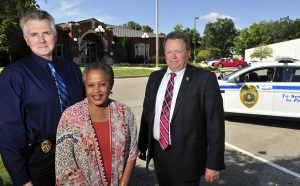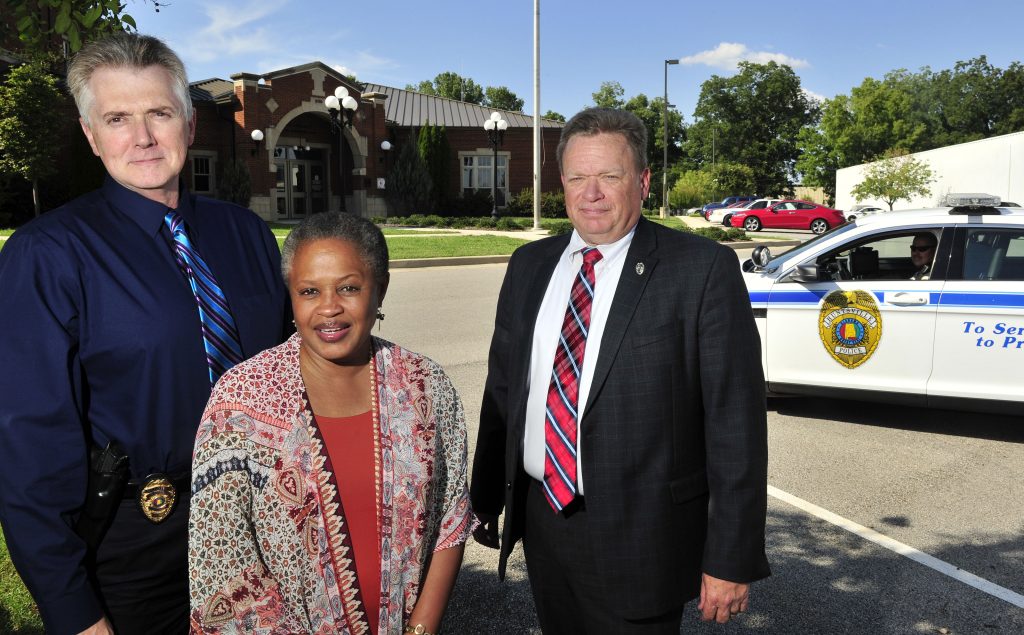One Year In – A Conversation with Police Chief Mark McMurray
Published on September 28, 2016

As Huntsville Police Chief Mark McMurray looks up from his desk, with manila files staggered in one neat row, other material perfectly organized, he sees the whiteboard on the opposite wall. There, in multiple colors, he has neatly written tasks to be accomplished.
Some already have a line struck through them – that great moment for to-do list’ers – but many more are ongoing. Says McMurray, “This is what wakes me up at 2 o’clock in the morning, thinking of what needs to be done.”
It is the occasion of McMurray’s first anniversary on the job. He was promoted from captain to chief effective Sept. 1, 2015, replacing the retiring Chief Lewis Morris.
“He was an excellent moral compass for this department,” McMurray says of his predecessor. “He stood for a lot of great things. He defined right from wrong for our team and kept people on the path.”
However, Morris was still dealing with aftershocks from the 2008 economic crisis and low tax revenues. The department grew antiquated in some of its equipment and assets. Thus, the items on McMurray’s whiteboard.
It’s hardly a one-man task to cross off those items.
“It’s been a terrific team-building exercise for this department,” McMurray says. “We’ve been giving the captains new tasks, with the help of (city administrator) John Hamilton. We’ve organized and we’ve streamlined the operation for the Huntsville Police Department and the chain of command.”
The new catchphrase in the department is “project management” and the two deputy chiefs and six captains have become project managers to lead the way on various initiatives, doing the research and seeing that things are implemented.
Among those projects, either crossed off the whiteboard to-do list or well underway:
- A new records system to replace an antiquated one
- A new firing range, set in motion by Morris, that enables HPD to avoid usage fees and the difficult access to the range at Redstone Arsenal
- A new Criminal Investigative Department building that will be a central location for investigators, prompting better communication to have them under one roof rather than assigned to the respective precincts
- Lights for firearms, helping insure officer safety and the safety of others
- New vehicles, including a fleet of SUVs with considerably better fuel mileage than the old cars, many of which haven’t been replaced in more than 10 years
- Each officer will eventually be armed with a taser. As McMurray notes, some 80 percent of people who are taken into custody are either drug- or alcohol-related cases or they have a mental illness. They’re often difficult to subdue and tasers “allow us to incapacitate people in a humane way where we can take them to jail and get the treatment they might need.”
- Two officers will be assigned to the FBI’s high-security National Forensics Lab at Redstone Arsenal to bring expertise in the growing challenge of internet theft and security
- New body cameras for each officer to complement dash cameras in use
There’s not enough room to list everything on the whiteboard. But what is taking place, and will take place in the coming years and months, puts the Huntsville Police Department “ahead of the curve,” McMurray says. “People across the country will be looking at us and asking how we’re doing this.”
“There’s not enough room to list everything on the whiteboard. But what is taking place, and will take place in the coming years and months, puts the Huntsville Police Department ‘ahead of the curve.’ People across the country will be looking at us and asking how we’re doing this.”
That is already happening. The Commission on Accreditation for Law Enforcement Agencies – the gold standard in public safety – recently gave HPD high marks for professional excellence. The CALEA report analyzes every aspect of police operations.
Mark McMurray just passed another anniversary with HPD, his 30th on the force, working his way up the ladder. This new position has taken him off the streets to a great extent, and he’s not the type to go rushing to the scene of the crime, one eye on the incident, another looking for TV cameras.
“I need to get the officers and department the resources they need to do their jobs. My time is best spent in here,” he says of his office and that looming list. “Those are bringing value to the people underneath me and getting things done. I do have to separate myself from the street. The officers don’t see me, but hopefully they see what’s done for them.”
Mark McCarter is a regular contributor for CityNews.

